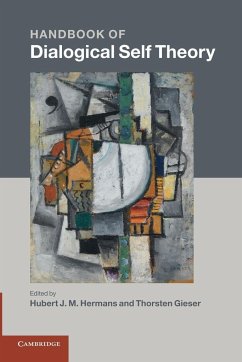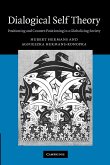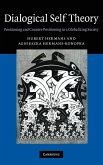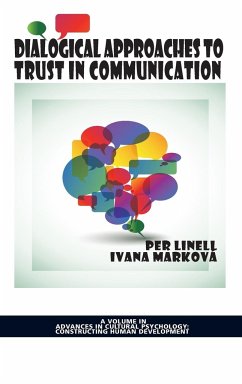Handbook of Dialogical Self Theory
Herausgeber: Hermans, Hubert J. M.; Gieser, Thorsten
Handbook of Dialogical Self Theory
Herausgeber: Hermans, Hubert J. M.; Gieser, Thorsten
- Broschiertes Buch
- Merkliste
- Auf die Merkliste
- Bewerten Bewerten
- Teilen
- Produkt teilen
- Produkterinnerung
- Produkterinnerung
This Handbook shows how dialogical self theory is useful for developing adaptive identities in a globalizing world.
Andere Kunden interessierten sich auch für
![Dialogical Self Theory Dialogical Self Theory]() Hubert HermansDialogical Self Theory64,99 €
Hubert HermansDialogical Self Theory64,99 €![The Dialogical Mind The Dialogical Mind]() Ivana MarkováThe Dialogical Mind43,99 €
Ivana MarkováThe Dialogical Mind43,99 €![Dialogical Self Theory Dialogical Self Theory]() Hubert J. M. HermansDialogical Self Theory132,99 €
Hubert J. M. HermansDialogical Self Theory132,99 €![Handbook of Dialogical Self Theory and Psychotherapy Handbook of Dialogical Self Theory and Psychotherapy]() Handbook of Dialogical Self Theory and Psychotherapy51,99 €
Handbook of Dialogical Self Theory and Psychotherapy51,99 €![Dialogical Approaches to Trust in Communication (Hc) Dialogical Approaches to Trust in Communication (Hc)]() Dialogical Approaches to Trust in Communication (Hc)114,99 €
Dialogical Approaches to Trust in Communication (Hc)114,99 €![Learning and Expanding with Activity Theory Learning and Expanding with Activity Theory]() Learning and Expanding with Activity Theory46,99 €
Learning and Expanding with Activity Theory46,99 €![The Cambridge Handbook of Identity The Cambridge Handbook of Identity]() The Cambridge Handbook of Identity188,99 €
The Cambridge Handbook of Identity188,99 €-
-
-
This Handbook shows how dialogical self theory is useful for developing adaptive identities in a globalizing world.
Produktdetails
- Produktdetails
- Verlag: Cambridge University Press
- Seitenzahl: 518
- Erscheinungstermin: 6. August 2013
- Englisch
- Abmessung: 229mm x 152mm x 28mm
- Gewicht: 742g
- ISBN-13: 9781107681064
- ISBN-10: 1107681065
- Artikelnr.: 40191054
- Herstellerkennzeichnung
- Libri GmbH
- Europaallee 1
- 36244 Bad Hersfeld
- gpsr@libri.de
- Verlag: Cambridge University Press
- Seitenzahl: 518
- Erscheinungstermin: 6. August 2013
- Englisch
- Abmessung: 229mm x 152mm x 28mm
- Gewicht: 742g
- ISBN-13: 9781107681064
- ISBN-10: 1107681065
- Artikelnr.: 40191054
- Herstellerkennzeichnung
- Libri GmbH
- Europaallee 1
- 36244 Bad Hersfeld
- gpsr@libri.de
Introductory chapter: history, main tenets and core concepts of dialogical self theory Hubert J. M. Hermans and Thorsten Gieser; Part I. Theoretical Contributions: Introduction Hubert J. M. Hermans and Thorsten Gieser; 1. Positioning in the dialogical self: recent advances in theory construction Peter T. F. Raggatt; 2. Time and the dialogical self John Barresi; 3. Developmental origins of the dialogical self: early childhood years Marie-Cécile Bertau; 4. Self-making through synthesis: extending dialogical self theory Jaan Valsiner and Kenneth R. Cabell; 5. Multiculturalism, multiple identifications and the dialogical self: shifting paradigms of personhood in sociocultural anthropology Toon van Meijl; 6. Acculturation and the dialogical formation of immigrant identity: race and culture in diaspora spaces Sunil Bhatia; 7. Psychodrama: from dialogical self theory to a self in dialogical action Leni M. F. Verhofstadt-Denève; 8. Identity construction among transnational migrants: a dialogical analysis of the interplay between personal, social and societal levels Seth Surgan and Emily Abbey; 9. Negotiating with autonomy and relatedness: dialogical processes in everyday lives of Indians Nandita Chaudhary; 10. Dialogicality and the Internet Vincent W. Hevern; 11. Schizophrenia and alterations in first-person experience: advances offered from the vantage point of dialogical self theory Paul H. Lysaker and John T. Lysaker; 12. The dialogical self in the new South Africa Graham Lindegger and Charl Alberts; Part II. Methods for Studying the Dialogical Self: Introduction Hubert J. M. Hermans and Thorsten Gieser; 13. Dialogicality and personality traits Piotr K. Ole
and Mägorzata Puchalska-Wasyl; 14. Spatial organization of the dialogical self in creative writers Renata
urawska-
y
a, El
bieta Chmielnicka-Kuter and Piotr K. Ole
; 15. Cognitive architecture of the dialogical self: an experimental approach Katarzyna Stemplewska-
akowicz, Bartosz Zalewski, Hubert Suszek and Dorota Kobyli
ska; 16. Voicing inner conflict: from a dialogical to a negotiational self Dina Nir; 17. Narrative processes of innovation and stability within the dialogical self Miguel M. Gonçalves and António P. Ribeiro; 18. Methodological approaches to studying the self in its social context Carol A. Jasper, Helen R. Moore, Lisa S. Whittaker and Alex Gillespie; Part III. Domains of Application: Introduction Hubert J. M. Hermans and Thorsten Gieser; 19. The use of I-positions in psychotherapy John Rowan; 20. Dialogically-oriented therapies and the role of poor metacognition in personality disorders Giancarlo Dimaggio; 21. Reconstructing the self in the wake of loss: a dialogical contribution Robert A. Neimeyer; 22. Creating dialogical space in psychotherapy: meaning-generating chronotope of ma Masayoshi Morioka; 23. Therapeutic applications of dialogues in dialogic action therapy David Y. F. Ho; 24. The depositioning of the I: emotional coaching in the context of transcendental awareness Agnieszka Hermans-Konopka; 25. The dialogical self and educational research: a fruitful relationship M. Beatrice Ligorio; 26. The self in career learning: an evolving dialogue Annemie Winters, Frans Meijers, Reinekke Lengelle and Herman Baert; 27. Navigating inconsistent consumption preferences at multiple levels of the dialogical self Shalini Bahl; Epilogue: a philosophical epilogue on the question of autonomy Shaun Gallagher.
and Mägorzata Puchalska-Wasyl; 14. Spatial organization of the dialogical self in creative writers Renata
urawska-
y
a, El
bieta Chmielnicka-Kuter and Piotr K. Ole
; 15. Cognitive architecture of the dialogical self: an experimental approach Katarzyna Stemplewska-
akowicz, Bartosz Zalewski, Hubert Suszek and Dorota Kobyli
ska; 16. Voicing inner conflict: from a dialogical to a negotiational self Dina Nir; 17. Narrative processes of innovation and stability within the dialogical self Miguel M. Gonçalves and António P. Ribeiro; 18. Methodological approaches to studying the self in its social context Carol A. Jasper, Helen R. Moore, Lisa S. Whittaker and Alex Gillespie; Part III. Domains of Application: Introduction Hubert J. M. Hermans and Thorsten Gieser; 19. The use of I-positions in psychotherapy John Rowan; 20. Dialogically-oriented therapies and the role of poor metacognition in personality disorders Giancarlo Dimaggio; 21. Reconstructing the self in the wake of loss: a dialogical contribution Robert A. Neimeyer; 22. Creating dialogical space in psychotherapy: meaning-generating chronotope of ma Masayoshi Morioka; 23. Therapeutic applications of dialogues in dialogic action therapy David Y. F. Ho; 24. The depositioning of the I: emotional coaching in the context of transcendental awareness Agnieszka Hermans-Konopka; 25. The dialogical self and educational research: a fruitful relationship M. Beatrice Ligorio; 26. The self in career learning: an evolving dialogue Annemie Winters, Frans Meijers, Reinekke Lengelle and Herman Baert; 27. Navigating inconsistent consumption preferences at multiple levels of the dialogical self Shalini Bahl; Epilogue: a philosophical epilogue on the question of autonomy Shaun Gallagher.
Introductory chapter: history, main tenets and core concepts of dialogical self theory Hubert J. M. Hermans and Thorsten Gieser; Part I. Theoretical Contributions: Introduction Hubert J. M. Hermans and Thorsten Gieser; 1. Positioning in the dialogical self: recent advances in theory construction Peter T. F. Raggatt; 2. Time and the dialogical self John Barresi; 3. Developmental origins of the dialogical self: early childhood years Marie-Cécile Bertau; 4. Self-making through synthesis: extending dialogical self theory Jaan Valsiner and Kenneth R. Cabell; 5. Multiculturalism, multiple identifications and the dialogical self: shifting paradigms of personhood in sociocultural anthropology Toon van Meijl; 6. Acculturation and the dialogical formation of immigrant identity: race and culture in diaspora spaces Sunil Bhatia; 7. Psychodrama: from dialogical self theory to a self in dialogical action Leni M. F. Verhofstadt-Denève; 8. Identity construction among transnational migrants: a dialogical analysis of the interplay between personal, social and societal levels Seth Surgan and Emily Abbey; 9. Negotiating with autonomy and relatedness: dialogical processes in everyday lives of Indians Nandita Chaudhary; 10. Dialogicality and the Internet Vincent W. Hevern; 11. Schizophrenia and alterations in first-person experience: advances offered from the vantage point of dialogical self theory Paul H. Lysaker and John T. Lysaker; 12. The dialogical self in the new South Africa Graham Lindegger and Charl Alberts; Part II. Methods for Studying the Dialogical Self: Introduction Hubert J. M. Hermans and Thorsten Gieser; 13. Dialogicality and personality traits Piotr K. Ole
and Mägorzata Puchalska-Wasyl; 14. Spatial organization of the dialogical self in creative writers Renata
urawska-
y
a, El
bieta Chmielnicka-Kuter and Piotr K. Ole
; 15. Cognitive architecture of the dialogical self: an experimental approach Katarzyna Stemplewska-
akowicz, Bartosz Zalewski, Hubert Suszek and Dorota Kobyli
ska; 16. Voicing inner conflict: from a dialogical to a negotiational self Dina Nir; 17. Narrative processes of innovation and stability within the dialogical self Miguel M. Gonçalves and António P. Ribeiro; 18. Methodological approaches to studying the self in its social context Carol A. Jasper, Helen R. Moore, Lisa S. Whittaker and Alex Gillespie; Part III. Domains of Application: Introduction Hubert J. M. Hermans and Thorsten Gieser; 19. The use of I-positions in psychotherapy John Rowan; 20. Dialogically-oriented therapies and the role of poor metacognition in personality disorders Giancarlo Dimaggio; 21. Reconstructing the self in the wake of loss: a dialogical contribution Robert A. Neimeyer; 22. Creating dialogical space in psychotherapy: meaning-generating chronotope of ma Masayoshi Morioka; 23. Therapeutic applications of dialogues in dialogic action therapy David Y. F. Ho; 24. The depositioning of the I: emotional coaching in the context of transcendental awareness Agnieszka Hermans-Konopka; 25. The dialogical self and educational research: a fruitful relationship M. Beatrice Ligorio; 26. The self in career learning: an evolving dialogue Annemie Winters, Frans Meijers, Reinekke Lengelle and Herman Baert; 27. Navigating inconsistent consumption preferences at multiple levels of the dialogical self Shalini Bahl; Epilogue: a philosophical epilogue on the question of autonomy Shaun Gallagher.
and Mägorzata Puchalska-Wasyl; 14. Spatial organization of the dialogical self in creative writers Renata
urawska-
y
a, El
bieta Chmielnicka-Kuter and Piotr K. Ole
; 15. Cognitive architecture of the dialogical self: an experimental approach Katarzyna Stemplewska-
akowicz, Bartosz Zalewski, Hubert Suszek and Dorota Kobyli
ska; 16. Voicing inner conflict: from a dialogical to a negotiational self Dina Nir; 17. Narrative processes of innovation and stability within the dialogical self Miguel M. Gonçalves and António P. Ribeiro; 18. Methodological approaches to studying the self in its social context Carol A. Jasper, Helen R. Moore, Lisa S. Whittaker and Alex Gillespie; Part III. Domains of Application: Introduction Hubert J. M. Hermans and Thorsten Gieser; 19. The use of I-positions in psychotherapy John Rowan; 20. Dialogically-oriented therapies and the role of poor metacognition in personality disorders Giancarlo Dimaggio; 21. Reconstructing the self in the wake of loss: a dialogical contribution Robert A. Neimeyer; 22. Creating dialogical space in psychotherapy: meaning-generating chronotope of ma Masayoshi Morioka; 23. Therapeutic applications of dialogues in dialogic action therapy David Y. F. Ho; 24. The depositioning of the I: emotional coaching in the context of transcendental awareness Agnieszka Hermans-Konopka; 25. The dialogical self and educational research: a fruitful relationship M. Beatrice Ligorio; 26. The self in career learning: an evolving dialogue Annemie Winters, Frans Meijers, Reinekke Lengelle and Herman Baert; 27. Navigating inconsistent consumption preferences at multiple levels of the dialogical self Shalini Bahl; Epilogue: a philosophical epilogue on the question of autonomy Shaun Gallagher.









